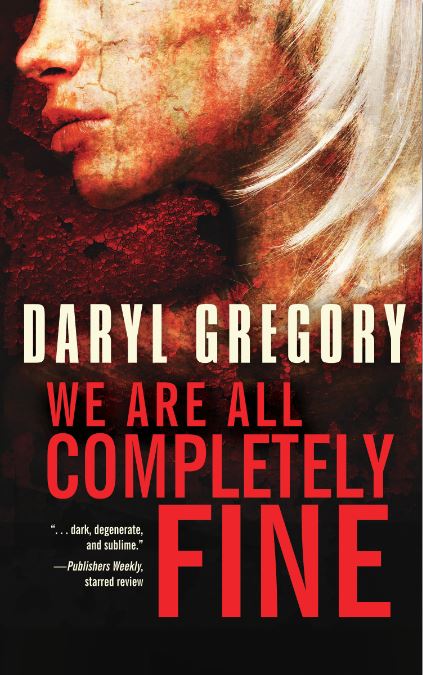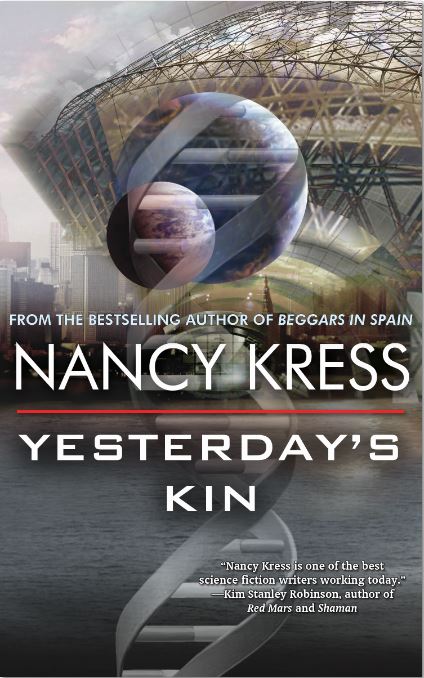 This past Monday, May 4, the finalists were announced for the 2015 Locus Awards -- and I'd like to take this opportunity to congratulate all the nominees in all categories. You can review the complete, Sad/Mad/Rabid Puppies-free list of nominees online at LocusMag.com.
This past Monday, May 4, the finalists were announced for the 2015 Locus Awards -- and I'd like to take this opportunity to congratulate all the nominees in all categories. You can review the complete, Sad/Mad/Rabid Puppies-free list of nominees online at LocusMag.com.
However, amongst all those nominees are two authors, in the "best novella" category, whom I especially wish to acknowledge: Daryl Gregory and Nancy Kress. I was involved in the production of these two books from Tachyon Publications, and I have to hope that my work had, even in some small way, contributed to this success.
In my February 27, 2014, blog post, I wrote of my work on Daryl Gregory's novella, We Are All Completely Fine . When I wrote that blog post more than a year ago, I wrote (and I quote): "...we'll be seeing this sharp-edged story on many awards lists beginning in early 2015." And, as I had predicted, We Are All Completely Fine has been nominated for the Nebula Award and the Shirley Jackson Award, in addition to the Locus Award. (And I won't speak any further about the Hugo Awards.)
. When I wrote that blog post more than a year ago, I wrote (and I quote): "...we'll be seeing this sharp-edged story on many awards lists beginning in early 2015." And, as I had predicted, We Are All Completely Fine has been nominated for the Nebula Award and the Shirley Jackson Award, in addition to the Locus Award. (And I won't speak any further about the Hugo Awards.)
Here's an excerpt from the fairly lengthy Publishers Weekly review:
"This complex novel—scathingly funny, horrific yet oddly inspiring—constructs a seductive puzzle from torn identities, focusing on both the value and peril of fear. When enigmatic Dr. Jan Sayer gathers survivors of supernatural violence for therapy, she unwittingly unlocks evil from the prison of consciousness....Blending the stark realism of pain and isolation with the liberating force of the fantastic, Gregory makes it easy to believe that the world is an illusion, behind which lurks an alternative truth—dark, degenerate, and sublime."–Publishers Weekly Starred Review
 The second novella is Yesterday's Kin
The second novella is Yesterday's Kin
Now you might be thinking that I say this about every project that I work on, but if you read this blog regularly, you would know that that's not true. In fact, I rarely boast about my projects being award worthy. In addition to these two novellas, the only other project that I recall making such a prediction was for the anthology The Children of Old Leech: A Tribute to the Carnivorous Cosmos of Laird Barron , edited by Ross E. Lockhart and Justin Steele and published by Word Horde. The anthology, by the way, is also a finalist for the Shirley Jackson Award, but that's for another blog post. So, for 2014, I'm three for three.
, edited by Ross E. Lockhart and Justin Steele and published by Word Horde. The anthology, by the way, is also a finalist for the Shirley Jackson Award, but that's for another blog post. So, for 2014, I'm three for three.
Nancy Kress and Tor.com have graciously posted an excerpt from Yesterday's Kin. The story is told from two alternating points-of-view, that of geneticist Marianne Jenner, and her youngest son Noah. This excerpt is from Marianne's POV.
And here's a snippet from the lengthy Kirkus review:
"The political turmoil created by Kress' aliens is a warning for the reader to pay more attention to how modern-day conflicts are handled.Science-fiction fans will luxuriate in the dystopian madness, while even nonfans will find an artful critique of humanity's ability to cooperate in the face of a greater threat."–Kirkus Reviews
Last, but certainly not least, a few words from a Hugo Award-winning editor:
"Nancy Kress delivers one of the strongest stories of the year to date…. As with all of Kress’s work, this is very nicely crafted, with well-paced prose that carries you through the story, complex human characters, a compelling and conflict-driven human story, a clever twist partway through, and an even cleverer twist at the end."–Gardner Dozois, editor of The Year's Best Science Fiction series
Update June 2, 2015: I neglected to mention that the winners of the Locus Awards will be announced during the Locus Awards Weekend in Seattle, June 26-28, 2015; Connie Willis will MC the awards ceremony.




